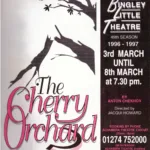Season 49 Play 5 – The Cherry Orchard by Anton Chekhov
Directed by
Cast
Lopakhin (Yermola), a businessman – Brian Otto
Yepikhodov, the estate clerk – lan Hartley
Firs, the footman – Peter Heaton
Anya, Ranyevskaya’s daughter – Abbé Robinson
Ranyevskaya(Lyuba), a landowner – Jackie Firth
Charlotta Ivanovna,the governess – Marilyn Brophy
Varya,Ranyevskaya’s adopted daughter – Carol Southby
Gayev (Lenya), Ranyevskaya’s brother – Howard Crawford
Simeonov-Pischik, a landowner – Peter Harris
Yasha, a young footman – Neil Bell
Trofimov (Petya), a student – Simon Calthrop
Stationmaster – David Poole
Postmaster – Sharaz Rashid
Party Guests/Peasants – Sharaz Rashid, Kate Richardson & Janet Jamieson
Synopsis
Chekhov saw his last play as a comedy; to others it was a serious drama of Russian life during the early years of the twentieth century. (Either way, it is the only Chekhovian play that does not contain a pistol shot!) The story centres on Mme Ranyevskaia and her family, unable even to see the challenge of the new generation over the leasing of the beautiful orchard on her estate. The time is May, but the danger of frost killing the blossom and all that signifies is very real.
Directors Notes
Anton Chekhov was born in 1860, the son of a grocer, in a small provincial seaport in southern Russia. In 1879 he enrolled or Moscow University to study medicine, and began to contribute sketches and short stories to a range of magazines. Qualfying as a doctor in 1884, he took up practice in Moscow but continued to wife for increasingly prestigious publications in Moscow and St Petersburg. ‘Ivanov’, his first play to be produced, was staged to a mixed reception in 1887. The Wood Demon’ (1889) survived for only three performances and Chekhov gave up playwriting, undertaking research on behalf of the government into Siberian penal colonies and provincial famine relief, before acquiring a country estate outside Moscow. Materially more comfortable, in 1896 he made
another foray into the theatre but, under-rehearsed and misunderstood by the cast, ‘The Seagull’ suffered a disastrous first night and survived only five performances. Chekhov determined never to write another play.
But two years later Stanislavski revived ‘The Seagull’ at the newly formed Moscow Arts Theatre to resounding success. Now that a theatre company existed that could stage his work effectively, Chekhov, though suffering from consumption, returned to play writing with ‘Uncle Vanya’ (1899), and ‘Three Sisters’ (1901), marrying Olga Kipper, an actress in the company, the same year, Chekhov’s health continued to decline. ‘The Cherry Orchard’ was written in 1903 when he was already ill and able only to work with difficulty. The first
performance, on 17th January 1904, Chekhov’ forty-fourth birthday, was a triumphant and emotional occasion; the play was halted between the third and forth acts while the dying author was brought on stage for speeches and presentations. Six months later he died
peacefully; Olga Kipper was at his bedside.


